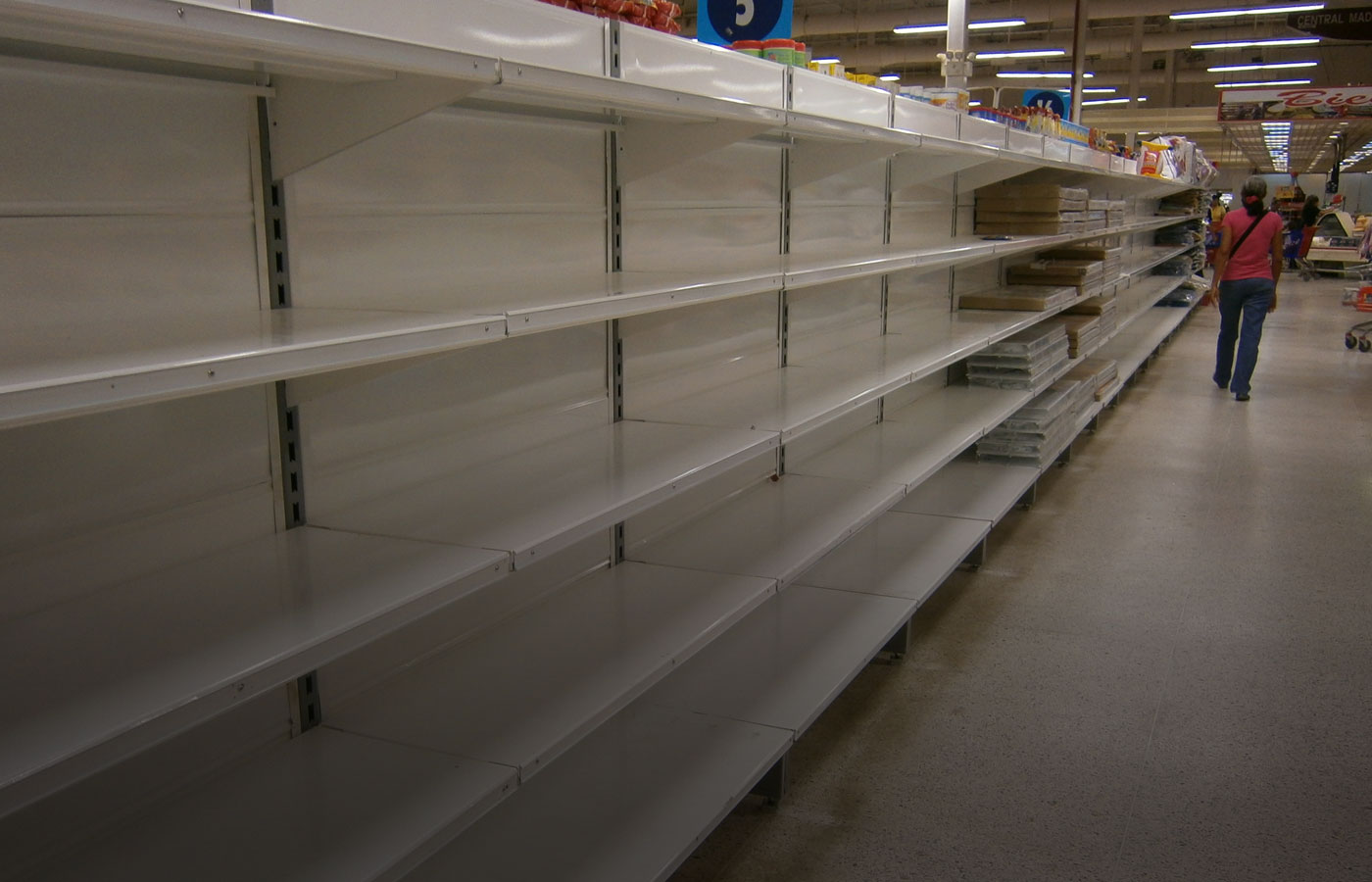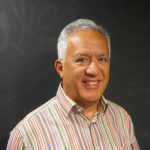The recent history of Venezuela represents the unfolding of a Faustian tragedy. A nation with immense resources, whose people have lived as if there were no end to the party, now finds itself with some of the most complicated problems of any country.
There are important lessons to be learned here, as Venezuela has gone from a nation of great wealth to one of even greater despair.
In 1976, I left Venezuela to study theology in Toronto, inspired by listening to former Lausanne Associate René Padilla in Caracas to dedicate my life to world evangelisation. I never went back to live in my native country. As I worked in over 60 countries, I seldom, if ever, met a Venezuelan living outside the country—that is, until the last couple of years.
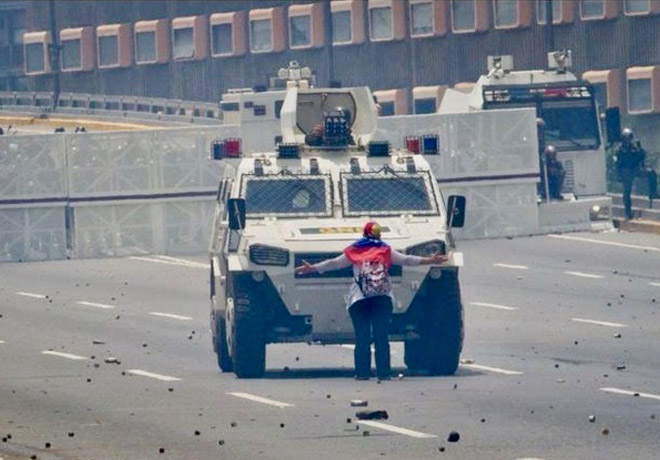
Descent into chaos
After the Second World War, Venezuela experienced an unprecedented economic boom. Oil wealth created a new environment in which money flowed freely and the nation quickly modernized. At the same time, a sense of ease and a ‘why worry’ attitude prevailed at all levels of society. Most foods were cheaper to import than to grow and process locally, despite the abundance of productive land.
In 1999, leftist populist Hugo Chávez became president with broad support, offering promises of social justice and equitable distribution of wealth. At first, he addressed major issues like housing, education, and health care, but soon he turned to building his own personal ‘Bolivarian dream’. He built up the military while warning of an impending ‘Yankee’ invasion. Infrastructure projects failed and proved to be fertile ground for widespread corruption.
In 2008, the price of oil collapsed. Chávez’s promises began to reveal a lack of coherent planning, and he was unable to bring the nation to its real potential. He died unexpectedly in 2013.
Chávez, like many Venezuelans, followed a mixture of Spiritism and Catholicism (in that order). He performed a ritual exhuming the bones of the Liberator Simon Bolivar through which he sought to claim his spirit and power. Now officials openly speak of Chávez as if he were still alive. He is venerated—his image is often placed on altars next to or above Jesus Christ.
His handpicked successor, Nicolás Maduro, took over. Under his stewardship, the country has degenerated into seemingly endless chaos. Maduro has responded to the myriad problems it faces by hardening his authoritarian position and repressing any kind of protest. In May, he conducted a highly controversial election in which the majority of the population refused to vote despite his inducements. Yet Maduro took it as his mandate.
Exodus
1.6M
left the country
between 2015 & 2017
Most Venezuelans are now ‘burned out’ as they basically just try to survive, and an unprecedented exodus of Venezuelans has ensued. According to the International Organization for Migration (IOM), some 1,642,442 left the country between 2015 and 2017.[1]
They leave in desperation because the food supply has collapsed. The government has reduced imports by 75 percent, instead choosing to use its hard currency to pay off the national debt. Since medicine has also traditionally been imported, the cuts have severely limited the availability of medicine too. Venezuela is in the midst of a medical crisis. HIV/AIDS, Malaria, Dengue Fever, and other diseases are on the rise. At the same time, there has been an explosion of criminal violence that has seen homicide rates far higher than in Baghdad and Kabul and also an alarming increase in cases of sex trafficking.
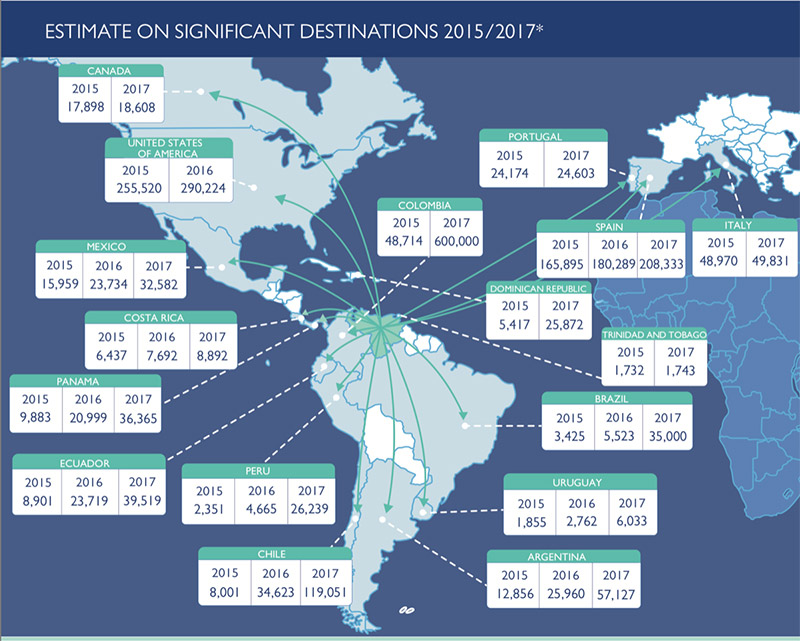
Source: http://robuenosaires.iom.int
Doing good while scattered or staying
Like myself, Venezuelans in the diaspora have found themselves in a new situation where our culture, resourcefulness, and humour have brought an interesting contribution to our new home countries. For example:
The crisis has also enabled others who have courageously chosen to stay in the country to explore fresh ways to bring hope to a broken people.
Lawyers, architects, and economists find themselves selling clothes in markets in Lima, working as nannies cleaning houses in Santiago de Chile and working in restaurants in Bogota.
Gustavo Dudamel, the acclaimed director of the Los Angeles Philharmonic, has made Venezuela known in positive ways.
Pastor Ramon Mendoza relocated first to Panama and now Mexico City, and serves as Latin America Director for Dynamic Church Planting International.
As our people are scattered, new opportunities arise for missions and for Venezuelans to be used by the Lord to bless the nations.
In our own family, we already have members living in ten nations; yet the majority are still in Venezuela. Some have put their faith in Jesus, others have not. All must deal with the difficult realities every day of just finding food and medical care.
By way of further example, Angel Rafael Arellano is an Industrial Psychologist who left an influential and successful career and is now in Bogota seeking to establish himself once again. There is a significant number of people like him who need the assistance and support of the local church, enabling them to bring a vital contribution to their new homes.
13K%
inflation this year
30%
unemployment
87%
living below the
poverty line
Yet, the crisis has also enabled others who have courageously chosen to stay in the country to explore fresh ways to bring hope to a broken people.
One of my many cousins, Pastor Abihail Lara, serves in Colonia Tovar. He sees that the internal situation now is far more complex than it often seems from the outside. For example:
Inflation is estimated by the IMF to be the highest in the world at 13,000 percent this year.[2]
There is no cash and the banking system is regularly interfered with by the government.[3]
The instability has resulted in constant insecurity, with 30 percent of the population unemployed and some 87 percent now living below the poverty line.
Efforts to bring hope to Venezuela
These pressures are forcing Christian ministries to think of new ways to impact people’s daily lives, starting with groups of believers that model the values of the Kingdom of God.
One model that seeks to live out this new perspective of service is developing in Pastor Lara’s community, La Colonia Tovar. Nexus, a new social enterprise engaging in agricultural projects together with local leaders, is growing fast crops and raising chickens and pigs, resulting in substantial blessings. The community of believers is expanding, demonstrating that help can come from inside the country.
However, since many have left, there is a need to train new leaders with willing hearts to serve holistically. This moved Pastor Lara to create another entity, Hagios, an online ministry for theological formation[4]:
Hagios is equipping pastors, who have a calling for theological education, to train others without pulling them out of their communities where their neighbours need them.
It is the first indigenous Venezuelan theological training program and reaches into various contexts where traditional training programs do not exist.
From any smart device a pastor or leader can access the Hagios platform and be trained without having to leave home.
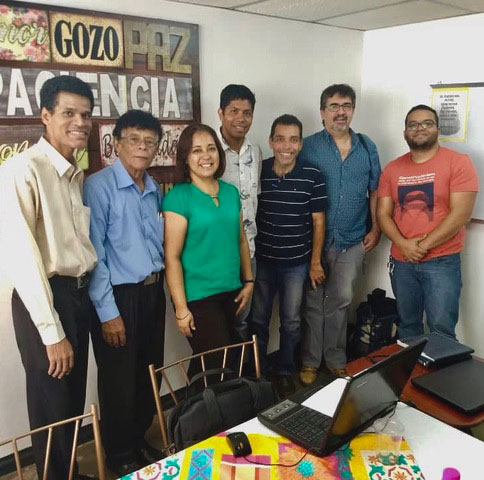
The Hagios Team
Hagios has also started a project for growing ‘Hagios communities’: small groups of online students who meet face-to-face seeking to find ways to influence their social and church environments.
Among expatriates, several people have initiated food drives and emergency items collections and are privately shipping them to Venezuela. The government is allowing this while openly rejecting offers of help from the US and EU. Others are able to send funds back from outside to support their families. The amounts are quite significant.
Our family’s contribution is been implemented in partnership with Nexus , the enterprise Pastor Lara has established. We have raised funds in the US to buy prime land which is being used to grow fast crops of nutritious vegetables. Funds have also been raised to build pig and chicken houses. These products are being used to feed the local community of believers and their needy neighbours. A portion is also being sold in the open market as a means to generate revenue for seed, although cash is useless as the inflationary trends make prices go up every day.
Agriculture has never been a priority in Venezuela. At this time more people are turning to it but the soil is generally fallow. A great deal of soil repair must be carried out. Organic technologies are desperately needed to make this viable.
The best strategy to awaken the ways of the Kingdom of God in Venezuela is to equip people to meet needs, giving hands and feet to the gospel.
How to bless Venezuela
The best strategy to awaken the ways of the Kingdom of God in Venezuela is to equip people to meet needs, giving hands and feet to the gospel. There is no question that the nation desperately needs food and humanitarian aid. Yet, while we meet immediate needs, we must encourage the men and women of God who are suffering the same adversities to acquire a new awareness of service and commitment to modeling Jesus in all dimensions of society, so that they may be the salt and the light for which Venezuela is longing (Matt 5:13-15).
As a Venezuelan, I know that I am not alone; there are many others leading efforts to meet needs from the outside. The best results are being achieved relationally, drawing minimum attention.
There is a lot of work to do and we need the global community to assist us practically wherever possible and to pray for people of peace to arise. Globally, we must own the pain of the Venezuelan people as much as we share the pain of injustice and inequality everywhere. With prophetic fervor, we must broadcast everywhere the atrocities that are being carried out in this country; and with merciful hearts, let us work together with our Venezuelan brothers and sisters, to bring renewed hope to their nation.
How to respond to Populism
In light of the emergence of populist political leaders globally, we must recognize the pitfalls and opportunities for the gospel. Populist leaders such as Chávez, Evo Morales in Bolivia, Donald Trump in the United States, Vladimir Putin in Russia, and also the leaders of Poland, Hungary, Czech Republic and most recently Italy, seem generally to end up pitting people against each other. These leaders have given a voice to groups that feel marginalized and powerless, but they also seek to use them to gain power. The re-emergence of Populism is resurrecting demons we thought were buried at the end of the Second World War.
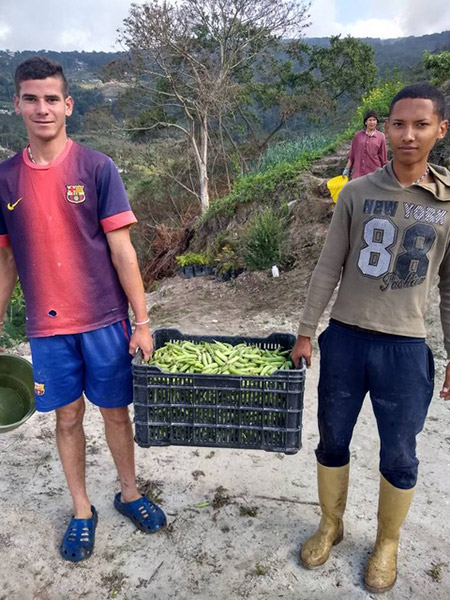
Harvesting the produce for distribution
Populists often pin present troubles on those who are easily caricatured as the embodiment of society’s woes. The easiest targets are immigrants, refugees, and minorities of all types. These people represent the very ones Jesus taught us to care for as a demonstration of the mercy and love of the Father. It is important to recognize that it is often the failure of Christians to set a tone of compassion which has left society without a clear sense of guidance as to how to deal with the others in our midst.
Populist leaders see that gap, but, instead of solving the problem, they use the problem to present themselves as ‘saviors’. We as people of the Kingdom must recognize that the demagoguery of Populism is incapable of delivering solutions and instead serves only to further polarize societies. We must repent of our sin of indifference and prejudice and eagerly seek to embrace those who are targeted by Populists.
The 65 million refugees globally represent a massive opportunity that we must embrace and creatively seek to accommodate in our communities.[5] By modeling reconciled communities we could answer the questions no one else is answering.
Endnotes
- Organización Internacional para las Migraciones, http://robuenosaires.iom.int/sites/default/files/Informes/National_Migration_Trends_Venezuela_in_the_Americas.pdf.
- International Monetary Fund, http://www.imf.org/en/Countries/VEN.
- Bloomberg, https://www.bloomberg.com/news/articles/2018-05-03/venezuela-orders-arrest-of-eleven-executives-from-banesco-bank.
- Hagios, http://hagios.tk/.
- Editor’s Note: See article by Cindy M. Wu entitled, ‘When We Too Were Strangers’, in the May 2018 issue of Lausanne Global Analysis https://lausanne.org/content/lga/2018-05/we-too-were-once-strangers.
